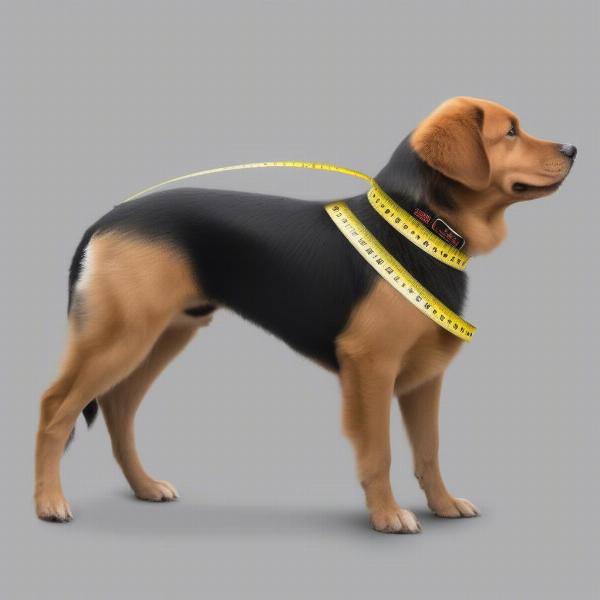A collar is more than just a fashion statement for your dog; it’s a crucial piece of equipment for their safety, identification, and training. Whether you’re bringing home a new puppy or looking to upgrade your adult dog’s collar, understanding the different types available and how to choose the right one is essential. This comprehensive guide from ILM Dog will help you navigate the world of dog collars, ensuring your furry friend has the perfect fit for their needs.
Choosing a collar might seem simple, but there’s more to it than meets the eye. From material and size to specific training requirements, several factors influence the ideal collar for your dog. We’ll explore everything from basic buckle collars to specialized training collars, helping you make an informed decision. This guide will equip you with the knowledge to select a collar that prioritizes both your dog’s comfort and your peace of mind.
Types of Dog Collars
There’s a wide variety of dog collars on the market, each designed for specific purposes. Here’s a breakdown of the most common types:
- Flat Collar: The most basic and widely used type. Great for everyday wear, attaching ID tags, and leash training.
- Martingale Collar: Designed to tighten slightly when pulled, preventing dogs from slipping out. Excellent for dogs with narrow heads or escape artists.
- Harness: Distributes pressure across the chest and shoulders, reducing strain on the neck. Suitable for dogs who pull or have respiratory issues.
- Head Collar: Resembles a halter and offers more control over the dog’s head. Helpful for training and managing reactive dogs.
- Choke Chain Collar: Controversial and generally not recommended for everyday use. Tightens around the neck when pulled, which can cause discomfort or injury if not used correctly.
- Prong Collar: Another controversial type with prongs that press into the dog’s neck when pulled. Should only be used under the guidance of a professional trainer.
Choosing the Right Size and Fit
A properly fitted collar is crucial for your dog’s comfort and safety. It should be snug but not too tight. You should be able to fit two fingers comfortably between the collar and your dog’s neck.
Measuring your Dog’s Neck
Use a flexible measuring tape to measure the circumference of your dog’s neck where the collar would normally sit. Add two inches to this measurement to ensure a comfortable fit.
 Measuring a Dog's Neck for Collar Size
Measuring a Dog's Neck for Collar Size
Material Matters: What Your Collar is Made Of
Collars come in various materials, each with its own pros and cons:
- Nylon: Durable, affordable, and easy to clean.
- Leather: Classic, stylish, and comfortable, but can be more expensive.
- Metal: Strong and long-lasting, but can be heavy and noisy.
- Biothane: Waterproof, durable, and easy to maintain.
Consider your dog’s lifestyle and individual needs when selecting a material.
Training Considerations: Collars for Specific Needs
Certain collars are better suited for specific training purposes:
- Puppy Collars: Lightweight and adjustable to accommodate growth.
- Training Collars: Martingale collars or head halters can be beneficial for leash training.
- No-Pull Harnesses: Designed to discourage pulling on the leash.
Always consult with a professional dog trainer before using specialized training collars like choke chains or prong collars.
Conclusion
Choosing the right collar for your dog involves careful consideration of several factors, including their size, breed, activity level, and training needs. A well-fitted, appropriate collar enhances your dog’s safety, comfort, and overall well-being. By understanding the different types of collars available and following the guidelines in this article, you can confidently select the perfect collar for your furry companion.
FAQs
- How often should I check my dog’s collar? Check your dog’s collar regularly for wear and tear and adjust the fit as they grow.
- Can my dog wear a collar all the time? Generally, yes, but remove the collar during crate time to prevent entanglement.
- What information should be on my dog’s ID tag? Include your dog’s name, your phone number, and your address.
- Are there collars specifically for small dogs? Yes, many brands offer collars designed for small breeds with smaller buckles and lighter weight materials.
- What if my dog keeps slipping out of their collar? Consider a martingale collar or a harness.
- Can I use a training collar on a puppy? Consult with a professional trainer before using any training collar on a puppy.
- How do I clean my dog’s collar? Cleaning instructions vary depending on the material. Refer to the manufacturer’s guidelines.
best choke collar for dogs are designed for specific training purposes. donut collar for dogs can be a comfortable alternative for recovery. For training, an e collar for dogs might be considered under professional guidance. A thor collar for dogs offers a stylish option, while a scooby collar for dogs is easily recognizable.
ILM Dog is your trusted resource for expert advice on all aspects of dog care, from breed selection and health to training and nutrition. We offer a wide range of resources and services to help you provide the best possible care for your canine companion. For further assistance or to learn more about our services, please contact us at [email protected] or call us at +44 20-3965-8624. Visit ILM Dog today for more valuable information about dog care and products.